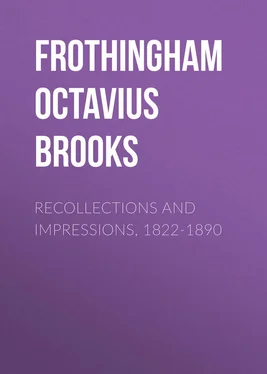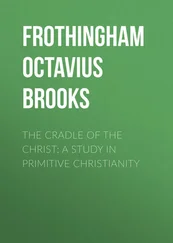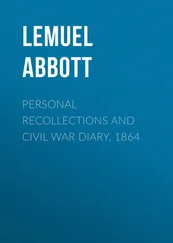Octavius Frothingham - Recollections and Impressions, 1822-1890
Здесь есть возможность читать онлайн «Octavius Frothingham - Recollections and Impressions, 1822-1890» — ознакомительный отрывок электронной книги совершенно бесплатно, а после прочтения отрывка купить полную версию. В некоторых случаях можно слушать аудио, скачать через торрент в формате fb2 и присутствует краткое содержание. Жанр: foreign_antique, foreign_prose, на английском языке. Описание произведения, (предисловие) а так же отзывы посетителей доступны на портале библиотеки ЛибКат.
- Название:Recollections and Impressions, 1822-1890
- Автор:
- Жанр:
- Год:неизвестен
- ISBN:нет данных
- Рейтинг книги:3 / 5. Голосов: 1
-
Избранное:Добавить в избранное
- Отзывы:
-
Ваша оценка:
- 60
- 1
- 2
- 3
- 4
- 5
Recollections and Impressions, 1822-1890: краткое содержание, описание и аннотация
Предлагаем к чтению аннотацию, описание, краткое содержание или предисловие (зависит от того, что написал сам автор книги «Recollections and Impressions, 1822-1890»). Если вы не нашли необходимую информацию о книге — напишите в комментариях, мы постараемся отыскать её.
Recollections and Impressions, 1822-1890 — читать онлайн ознакомительный отрывок
Ниже представлен текст книги, разбитый по страницам. Система сохранения места последней прочитанной страницы, позволяет с удобством читать онлайн бесплатно книгу «Recollections and Impressions, 1822-1890», без необходимости каждый раз заново искать на чём Вы остановились. Поставьте закладку, и сможете в любой момент перейти на страницу, на которой закончили чтение.
Интервал:
Закладка:
It was, indeed, a most suggestive and inspiring time. Never shall I forget, never shall I cease to be grateful for, the communion with noble minds that was brought about, the moral earnestness that was engendered, the moral insight that was quickened. Then, if ever, we ascended the Mount of Vision. I was brought into close communion with living men, the most living of the time, the most under the influence of stimulating thoughts; and if they were intemperate in their speech, extravagant in their opinions, absolute in their moral judgments, that must be taken as proof of the depth of their conviction. They loved much, and therefore could be forgiven, if forgiveness was necessary. They sacrificed a good deal, too, some of them everything in the shape of worldly honor, and this brought them apparently into line with the confessors and saints. They made real the precepts of the New Testament. Their clients were the poor, the lowly, the disfranchised, the unprivileged, against whom the grandeurs of the world lifted a heavy hand. They were champions of those who sorrowed and prayed, and this was enough to win sympathy and disarm criticism. It was a great experience; not only was religion brought face to face with ethics, but it was identified with ethics. It became a religion of the heart: pity, sympathy, humanity, and brotherhood were its essential principles. At the anti-slavery fairs all sorts and conditions of men met together, without distinction of color or race or sex. There was really an education in the broadest faith, in which dogma, creed, form, and rite were secondary to love; and love was not only universal, but was warm.
Salem was the home of story and legend. There Puritanism showed its best and worst sides, for there Roger Williams preached, and there the witches were persecuted. The house where they were tried and the hill where they were executed were objects of curiosity. There were the wild pastures and the romantic shores, and broad streets shaded by elm trees, and gardens and greenhouses. There were spacious mansions and beautiful country-seats and pleasant walks. There was beauty and grace and accomplishment and wit. There were quaint old buildings, and ways once trodden by pious and heroic feet. On the whole, this was the most idyllic period in my ministry. Thither came Emanuel Vitalis Scherb, the native of Basel, an exile for opinion's sake, a man full of genius, learning, enthusiasm. Young, handsome, hopeful, his lectures on German literature and poetry attracted notice in Boston, whence he came to Salem to talk and be entertained. The best houses were open to him; the best people went to hear him. Alas, poor Scherb! His day of popularity was short. He sank from one stage of poverty to another; he was indebted to friends for aid, among the rest to H. W. Longfellow, who clung to him till the last, and finally died from disease in a military hospital early in our Civil War.
I remember, in connection with Samuel Johnson, collecting an audience for Mr. A. B. Alcott, the most adroit soliloquizer I ever listened to, who delivered in a vestry-room a series of those remarkable "conversations" – versations with the con left out – for which he was celebrated. It was, in many respects, a happy time.
V.
THE CRISIS IN BELIEF
I was in Salem when this came. It happened in the following way: A woman in my choir, a melancholy, tearful, forlorn woman, asked me one day if I knew Theodore Parker. I said I did not, but then, seeing her disappointment, I asked her why she put that question. She replied that her husband had abandoned her some months before and with another woman had gone to Maine. There he had left the woman and was living in Boston, and was a member of Mr. Parker's Society; and she thought that if I knew Mr. Parker I might find out something about him, and perhaps induce him to come back to Salem. I told her I was going to Boston in a day or two, and would see Mr. Parker.
My visit, again and again repeated, resulted in an intimacy with that extraordinary man which had a lasting effect on my career. His personal sympathy, his profound humanity, his quickness of feeling, his sincerity, his courage, his absolute fidelity of service, even more than his astonishing vigor of intellect and his earnestness in pursuit of truth, made a deep impression on my mind. To be in his society was to be impelled in the direction of all nobleness. He talked with me, lent me books, stimulated the thirst for knowledge, opened new visions of usefulness. As I recall it now, his influence was mainly personal, the power that comes from a great character. He communicated a moral impetus. Faith in man, love of liberty in thought, institution, law, breathed in all his words and works. His theological ideas were somewhat mixed, as was inevitable then. His gift of spiritual vision, especially as shown in his interpretation of the Old-Testament narratives, may have been imperfect; his moral perspective may have been incomplete; his learning was copious, rather than discerning. But his single-mindedness was perfect, and his devotion to his fellow-men was almost superhuman. It was a privilege to know such a man, so simple-hearted and brave. The slight disposition to put himself on his omniscience, to strike an attitude, was not strange considering his enormous force, his consciousness of power, his singular influence over men, and his conviction (in large measure forced on him by his advocates) that he was a religious reformer, a second Luther, the inaugurator of a new Protestantism. His three doctrines, to which he constantly appealed, and in proof of which he adduced the testimony of the human soul, – the existence of a personal God, the immortality of the individual, and the absoluteness of the "moral law" might have been untenable in the presence of modern knowledge under the form in which he stated them. His vast collection of materials in attestation of Theism may have been valuable chiefly as a curiosity; but the man himself was all of one piece, genuine through and through. The mingling of fire and moderation in him was very remarkable, the blending of consuming radicalism with saving conservatism puzzled his more vehement disciples; but his character interested everybody; his firmness was visible from afar, and his warmth of heart was felt through stone walls. There were no two ministers in Boston who did as much for the inmates of hospitals and prisons as he did. His ministry ceased a quarter of a century ago, but the effect is vital yet, and will last for years to come. At this distance the heart leaps up to meet him. His chief work was done, for it consisted mainly in the adoption of a type of character, and length of days is not needed for this, while it is apt to be impaired by the infirmities of age. His long, wearisome illness, full of weakness and pain, tested the strength of his fortitude, patience, hopefulness, and trust, and was interesting as showing the passive, acquiescent side of heroism, all the more impressive in view of his love of life, his desire to finish his course, his sense of accountability (stronger in him than in anybody I ever met), and his wish to serve his kind. It was my happiness, more than ten years after he went away from men, to dwell for months in his atmosphere, while writing his biography, and all my old impressions of him were confirmed. And five years later, reviewing his life in the Index , I was again struck by his greatness. I may be excused for quoting the closing passage from the Index , of July 5, 1877, in which I stated the claims of Theodore Parker to the honor of posterity. The paragraph sums up the qualities that have been ascribed to him – integrity, catholicity, outspokenness; to these might have been added warmth of heart, but this last attribute lay on the surface, and could be easily appreciated by ordinary observers – in fact, was seen and acknowledged by his enemies, and by those who knew him least.
Читать дальшеИнтервал:
Закладка:
Похожие книги на «Recollections and Impressions, 1822-1890»
Представляем Вашему вниманию похожие книги на «Recollections and Impressions, 1822-1890» списком для выбора. Мы отобрали схожую по названию и смыслу литературу в надежде предоставить читателям больше вариантов отыскать новые, интересные, ещё непрочитанные произведения.
Обсуждение, отзывы о книге «Recollections and Impressions, 1822-1890» и просто собственные мнения читателей. Оставьте ваши комментарии, напишите, что Вы думаете о произведении, его смысле или главных героях. Укажите что конкретно понравилось, а что нет, и почему Вы так считаете.












